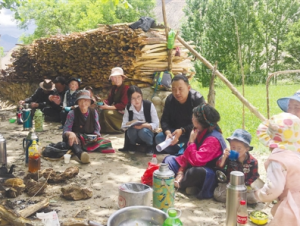
Photo: vtibet.com
China has deployed a new way of concealing their suppression of human rights in Tibet which also aims to increase loyalty to the Party through their new campaign Four Emphases and Four Loves, according to a report on the Human Rights Watch (HRW) website.
Sophie Richardson, the China Director of HRW, says in the report, “Tibet, a region known for systemic, state-sponsored human rights violations, is now awash with posters celebrating the “Four Emphases and Four Loves.” The campaign requires people to “Love the core by emphasising the Party’s kindness/Love the motherland by emphasising unity/Love your home by emphasising what you can contribute/Love your life by emphasising knowledge.”
The HRW report explains the meaning of the new campaign which tells people not to criticise policies or officials but to show loyalty and gratitude to the core – the Chinese Communist Party (CCP) and its leader Xi Jinping. It says the way to love the motherland is to oppose anything that threatens unity which includes seeking independence and greater autonomy. To be a good citizen of the country, focus on what you can contribute – but what can be contributed or what cannot is up to the Party.

Photo: vtibet.com
Photos of children in primary schools in Lhasa, the capital of Tibet, show children speaking their “hearts to Grandpa Xi [the Chinese President]” and one photo was captioned: “The words of the heart spelled out in…small notes.” These campaign materials are published on both the Tibetan and English site of Vtibet.com – a Chinese, Tibetan and English news site.
In another report published on Vtibet.com on June 9, a photo shows a staff member of the People’s Procuratorate of Gyatsa County teaching the main ideas of “four merits and four loves” to locals in Gyurdoy village in Gyatsa town in Lhoka city. Gyatsa County is in the south of Tibet, located around 600 kilometres from Lhasa. The report states that the People’s Procuratorate of Gyatsa County are doing door to door visits in Tibetan villages to push the main ideas of the campaign.

People’s Procuratorate of Gyatsa County with local Tibetans during the campaign preaching
Photo: Tibet Daily
Alongside this campaign, the CCP remains suspicious of Tibetans’ loyalties, as evident from ever increasing security surveillance and methodical insertion of state control into all aspects of religious practices in Tibet. “Tibetans – and many others across China – have virtually no ability to help develop, change, or object to the policies that profoundly affect their lives,” said Sophie Richardson, and added, “Propaganda – no matter how treacly, and no matter how many pink hearts deployed – is unlikely to generate the kind of loyalty or respect Chinese authorities seem to want from Tibetans. Respect for Tibetans’ human rights, on the other hand, might go a long way towards that goal.”




 Print
Print Email
Email